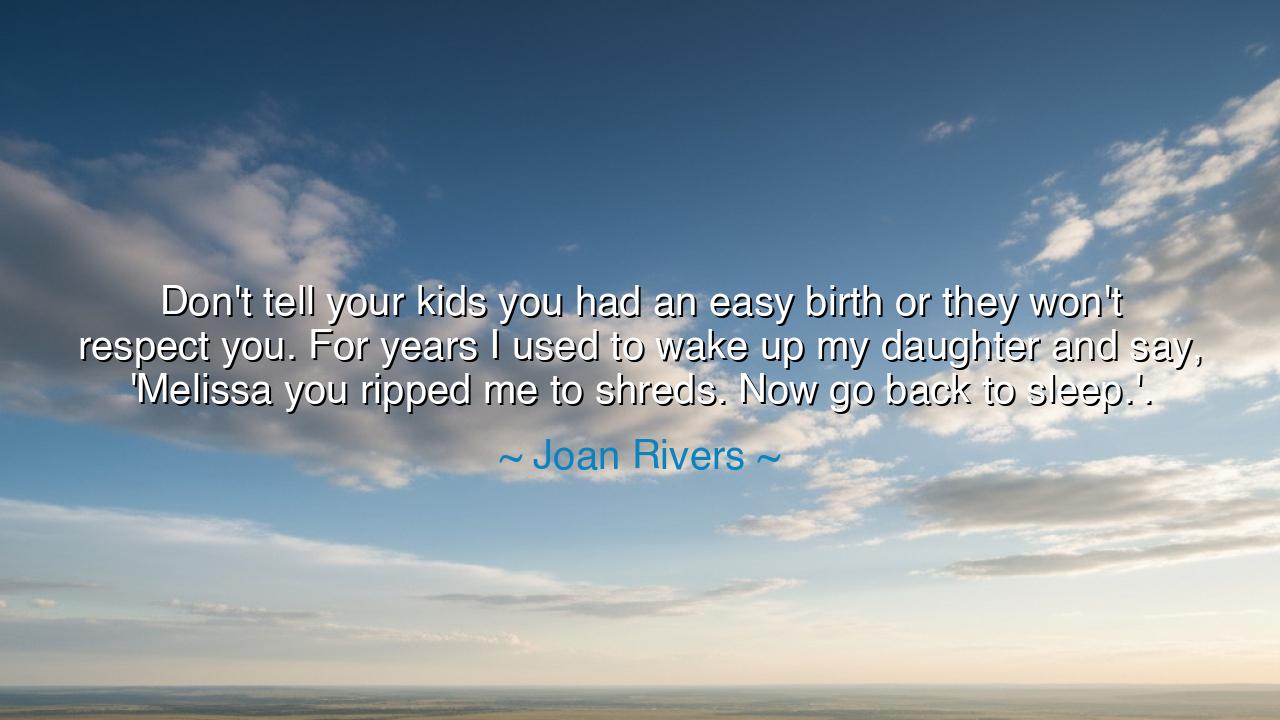
Don't tell your kids you had an easy birth or they won't respect
Don't tell your kids you had an easy birth or they won't respect you. For years I used to wake up my daughter and say, 'Melissa you ripped me to shreds. Now go back to sleep.'.






Hear, O children of tomorrow, the voice of Joan Rivers, who in her wit concealed the wisdom of ages. She spoke with laughter, yet her words carried truth: “Don’t tell your kids you had an easy birth or they won’t respect you. For years I used to wake up my daughter and say, ‘Melissa you ripped me to shreds. Now go back to sleep.’” Though uttered in jest, this saying bears the weight of experience, reminding us that suffering, sacrifice, and love are the foundation stones of respect between parent and child. Beneath her humor lies the eternal law—that the path to life is paved with pain, and that to honor the gift of life, we must remember the struggle from which it was born.
The birth of a child is no simple moment; it is the crossing between worlds, where the mother becomes both warrior and sanctuary. Rivers’ jest is a mother’s way of saying: “Do not forget what it cost me to bring you here.” For when children believe that life came easily, they may take lightly the sacrifices made for them. But when they hear of blood, tears, and endurance, they learn reverence for the unseen battles fought on their behalf. This is not cruelty, but truth wrapped in laughter, for love that hides its sacrifices is love that risks being taken for granted.
Consider the tale of Alcmena, mother of Heracles, in the myths of Greece. When she bore the son destined to be a hero, her labor was prolonged and tormented, stretched by the will of the goddess Hera. It is told that Alcmena cried out in agony for days, until divine intervention allowed her to deliver her son. From her pain was born one of the greatest of heroes. Heracles’ story is known, but seldom do we pause to honor the strength of the woman who bore him. So too does Rivers remind us: children must not forget the suffering of their mothers, for it is in that fire that their very being was forged.
The humor in Rivers’ words also carries a deeper truth about respect. In every generation, parents seek the honor of their children, but honor cannot be demanded—it must be earned, revealed, and reminded. By telling her daughter of the hardship of her birth, Rivers both lightened the weight of memory and impressed upon Melissa the reality of her mother’s devotion. For respect grows not from silence, but from stories passed down, stories that weave together love, sacrifice, and endurance.
Let us also see in these words a lesson for all of life: those who inherit blessings must be told the struggles that made them possible. When a people forget the labor and suffering of their ancestors, they become careless with their freedoms. The child who believes that life came without cost may squander it. Thus, it is the duty of parents, elders, and teachers to tell the truth—not to burden the young with guilt, but to shape their hearts with gratitude.
The practical wisdom here is plain. O parents, do not hide your struggles entirely from your children. Tell them, with humor if you must, of the battles you fought, the nights you endured, the sacrifices you made. Let them see not only your strength but also your vulnerability, for both are holy. In this way, they will learn that life is not free, that love demands endurance, and that respect is born from remembering the cost.
So, the teaching of Joan Rivers, though wrapped in jest, is timeless: do not veil the struggle of birth or of love, lest the next generation forget its price. Tell your stories, laugh at your wounds, and remind your children that they are not only blessings but also the fruits of your labor. For when they understand, their respect will deepen, their gratitude will grow, and they will walk with greater humility in the world.






AAdministratorAdministrator
Welcome, honored guests. Please leave a comment, we will respond soon